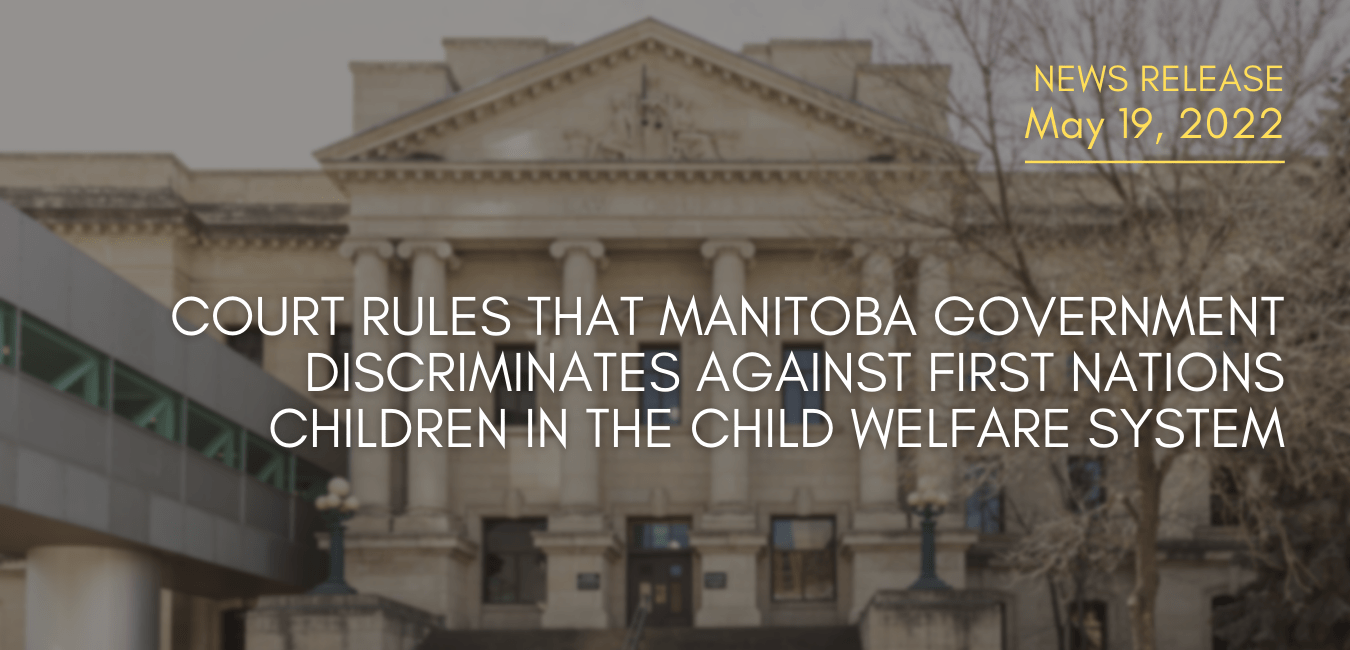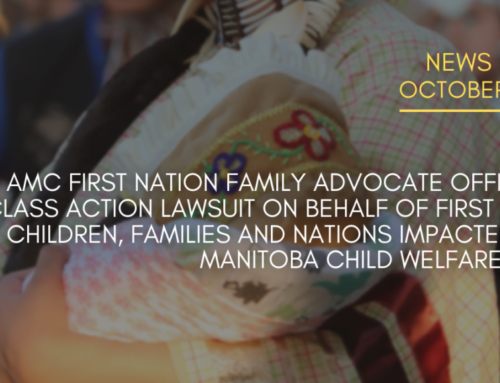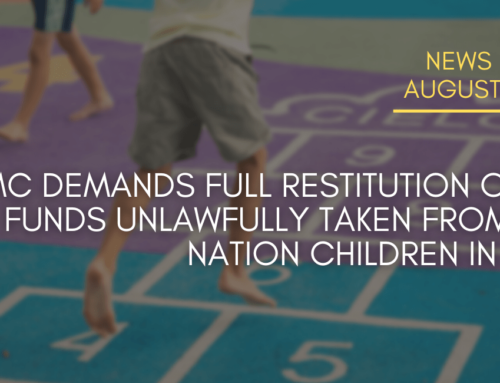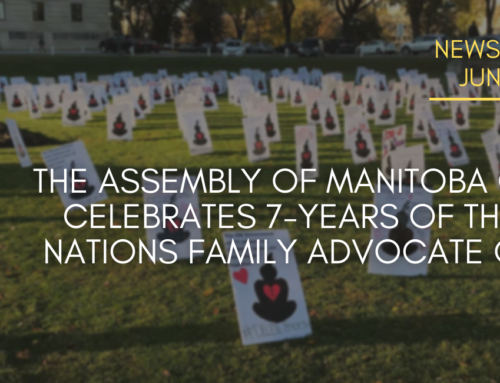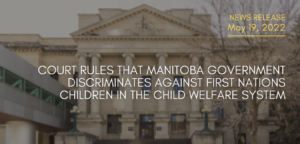 Treaty 1 Territory, Manitoba – Yesterday, the Manitoba Court of Queen’s Bench ruled that the government of the province of Manitoba discriminates against First Nations children in the provincial Child and Family Services (CFS) system, and that its attempt to absolve itself of liability for holding back the federal Children Special Allowance (CSA) of over $334 million from children and youth in care was unlawful and constitutionally invalid.
Treaty 1 Territory, Manitoba – Yesterday, the Manitoba Court of Queen’s Bench ruled that the government of the province of Manitoba discriminates against First Nations children in the provincial Child and Family Services (CFS) system, and that its attempt to absolve itself of liability for holding back the federal Children Special Allowance (CSA) of over $334 million from children and youth in care was unlawful and constitutionally invalid.
Chief Cornell McLean, the Assembly of Manitoba Chiefs (AMC) Acting Grand Chief, said, “This is a critically important victory for the most vulnerable people in society: our First Nation children. The participation of the AMC, in this case, is directly reflective of the leadership and commitment of the Chiefs in Manitoba to continue to advocate strongly for our children. Yesterday’s ruling sends a strong message that Manitoba can no longer treat First Nations children as commodities. Over the years, there has been a consistent increase in the number of children apprehended and placed into CFS care, and the more children in care, the more Manitoba was able to capture their CSA. The result was the provision of less than adequate supports for First Nations children that would ensure an equitable life.”
The AMC’s position was supported by a number of supporting affidavits from leaders, and Elders and knowledge keepers, including from AMC Grand Chief Arlen Dumas, Pimicikamak Cree Nation Chief David Monias, and Black River First Nation Chief Sheldon Kent. Consistent with the submissions of the AMC, the Court found the CSA clawback had a very overwhelmingly disproportionate and discriminatory “adverse impact” on First Nation children in care. It expressly relied on the evidence of the First Nation Family Advocate Office of AMC that First Nation children in care are more likely to live in poverty, suffer poor educational outcomes and be overrepresented in the criminal justice system.
“I am very pleased that the Court found the CSA policy implemented by Manitoba infringes section 15 of the Charter. Going forward from this ruling, I want to see equitable funding provided for our children and youth in care so that they get the resources needed to assist them in life moving forward. First Nations children deserve a fair chance as other youth,” stated Chief Sheldon Kent.
“This ruling has been a long time coming. It is one step toward holding Manitoba accountable for its actions that specifically target First Nations children. Our children are sacred, and we will continue to advocate and continue challenging these systems that have failed our families and children,” stated Chief David Monias, Pimicikamak Cree Nation.
As part of the conclusion of the decision, the Court stated that “it [was] a violation of s. 15(1) [of the Charter] by Manitoba to preclude children in care from receiving the CSA Benefits and then enacting s. 231 of BITSA to make the CSA Policy law in Manitoba.”
Acting Grand Chief McLean concluded, “It is clear that the provincial system does not serve the best interest of our children, and as a result, our families and Nations. The AMC has been consistent and clear since its inception and the Aboriginal Justice Inquiry – Child Welfare Initiative: the provincial system must go and be replaced by one under First Nations’ jurisdiction. It is clear that both the former NDP government that instituted the CSA policy and the current Conservative government that tried to legislate it and prevent any recourse were acting contrary to the Charter. The government and its policies have manipulated the approach and intent of devolution of the provincial CFS system. I urge the current Conservative government to honour the decision and immediately settle the outstanding remedies, and not appeal the decision. We also call on all provincial parties to declare they will work with the AMC and First Nations in Manitoba to finally complete devolution in order to create a system under First Nations jurisdiction and laws.”
BACKGROUND
The Children’s Special Allowances (CSA) is a monthly payment by the federal government to the province of Manitoba or private child welfare agencies to be used exclusively for the care, maintenance, education, and advancement of children in care. The CSA is used to support the care of First Nations children through education, training, and recreational activities.
Since 2005, the Manitoba government has required child welfare agencies to remit the CSA amount they receive from the federal government back to the province. As a result, the most vulnerable children in society have not received the necessary funding to ensure their social inclusion. The amount taken by the Manitoba government from children in care totaled over $334 million.
When the Conservative government was in opposition, it called the practice of CSA claw backs illegal and immoral. Once in power, it deemed the claw backs, which occurred from January 1, 2005, to March 31, 2019, as lawful and pre-vented legal actions against the claw backs during this period.
On November 6, 2020, the Manitoba government passed the Budget Implementation Tax Statutes Amendment Act (BITSA), in which section 231 attempted to retroactively authorize its taking of CSA funds. This legislation also sought to absolve Manitoba of all liability for doing so, including by preventing any lawsuits against Manitoba over it taking of CSA funds.
The following day, the AMC challenged the provincial BITSA as section 231 denied First Nations children involved in the Child and Family Service system access to justice.
Consistent with the arguments of the AMC, the Court found that Section 231 of BITSA “overwhelmingly impacts the Indigenous children and disabled children in care. The CSA policy prevented the claimant group from receiving equal benefit of the law resulting in economic and social consequences to Indigenous children in care.”
This decision does not require the Manitoba government to return the money to children whose CSAs were taken. However, it does find that Manitoba’s taking of the CSA funds was discriminatory and permits separate lawsuits, two of which have already been initiated, to proceed against the government to re-cover CSA funds.


